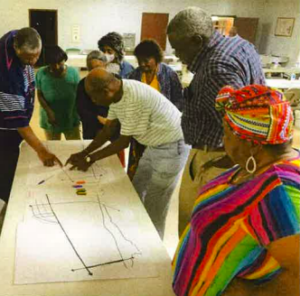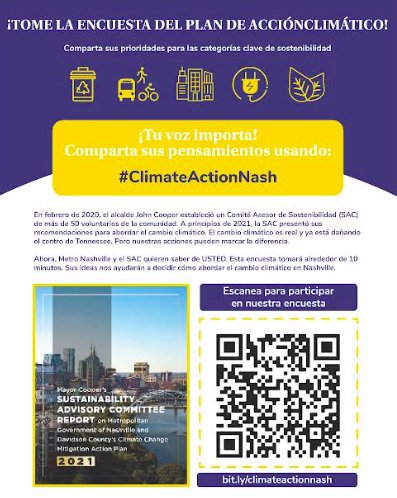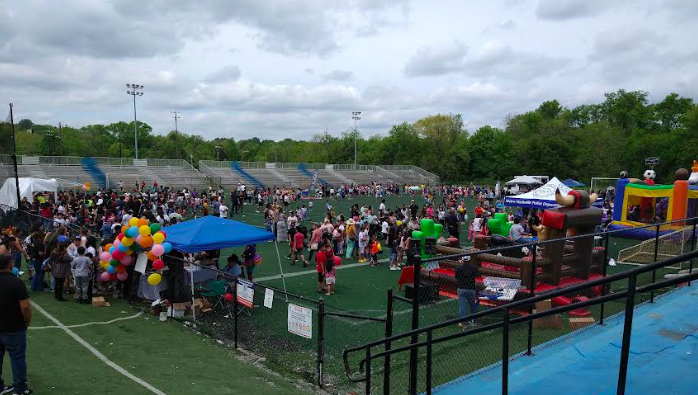SSDN Communities Make Strides in Participatory Engagement, Supported by 2021 Community Collaboration Catalyst MicroGrant Award
With support from The Kresge Foundation, SSDN launched its new Community Collaboration Catalyst Micro Grant Program in 2021. This program provided small grants to local government and community partnerships for the purposes of supporting equity-centered community leadership and engagement in local climate and resilience planning and program development. Grantees tested innovative approaches to engagement for climate action, resilience, adaptation, and local flooding issues. Grantees included:
- Athens-Clarke County, GA and lead partner Athens Land Trust
- Decatur, GA and lead partner Southface
- Fairfax, VA and lead partner Institute for a Sustainable Earth, George Mason University
- Knoxville, TN and lead partner SEEED Knoxville
- Nashville, TN and lead partner Civic Design Center
- Richmond, VA and lead partner Virginia Community Voice

Athens community meeting, photo courtesy of Athens Land Trust.
The outcomes of these projects reflect the values of equitable and participatory community development that SSDN encourages in its network. They increased levels of community engagement around adaptation and resilience goals; developed and tested new models for outreach centered in equity; provided education on climate, sustainability, adaptation and resilience topics that impact their community; and they collected quantitative and qualitative data to inform their plans, policies and programs. Grantees reached nearly 5,000 citizens collectively with a variety of types of outreach events and efforts, with some participants compensated for their time via gift cards.

Image courtesy of Nashville Davidson County Metro Government/.
Approaches to reaching diverse audiences
Nashville, Richmond, Knoxville, and Athens hosted a variety of types of meetings and outreach events in both Spanish and English, hosting events for children, teens, and adults alike.. Richmond purchased gift cards to incentivize reader input and feedback..
Community-led research practices
Knoxville developed a participatory action research agenda where they taught young people about social sciences and how to lead on outreach efforts, collect data, analyze and present data and create plans of action.
Fairfax’s goal was to establish community-driven ways to inform local government plans and programs. The city partnered with George Mason University to establish a community of research and practice around stormwater issues and participatory planning for development, preparing their community to be more involved in future development planning efforts.
Elevating community leadership
Fairfax’s efforts resulted in the assembly of a community-led team, who applied for a National Science Foundation planning grant that would allow the city and its university partner to use data to respond to – and predict – large storm events. This knowledge would help develop guidance on how to prepare for storms and increase community involvement in the preparation process; Richmond hired coaching support for nonprofit partners to be more supportive in outreach efforts and reaching diverse audiences; Athens created a community-based advisory board to elevate neighborhood needs.
Leveraging partnerships and/or funding
Knoxville’s team leveraged this effort to establish a new partnership with University of Tennessee, United Way, EPA, and Oak Ridge National Laboratory, resulting in in-kind mapping services and $50,000 from the EPA; Fairfax’s team applied for a new federal grant opportunity with NSF.
Community information campaigns at the regional scale
Fairfax is testing new ways to raise awareness about stormwater and flooding issues, outlining actions that the community can take to prepare for such eventualities. They identified stormwater issues and partnered with the Northern Virginia Regional Commission to create videos and launch an education campaign at a regional scale.

Image courtesy of Nashville Davidson County Metro Government.
What have we learned so far?
While it is good to envision the process of a community finding their own solutions to upcoming climate change, you have to start where the community wants to start. Many realized that they need to address basic needs that communities have today, e.g., that people are struggling financially and may not feel safe in their own neighborhood, before they can address issues that will become more severe in the future, like the impacts of climate change.
Working in this semi-post Coronavirus environment makes in-person outreach very hard. Using online surveys became challenging to rely on as an engagement tool. Due to so much online engagement, there is survey fatigue and virtual fatigue overall. Therefore, a number of our awardees pivoted to using one-page paper surveys, or adjusted their approach toward more focused gatherings in small groups. Some did not meet initial goals for outreach due to the challenging environment with which we are currently being faced.
Flexible funding is critical from funders in order to accommodate community needs, and SSDN’s small grants primed grantees to demonstrate to their local funding partners that new ways of approaching participatory community planning for sustainability and resilience are possible.